Volkswagen Emission Scandal: Impact of CSR on Business Performance
VerifiedAdded on 2022/09/10
|6
|1218
|27
Report
AI Summary
This report provides a comprehensive analysis of the Volkswagen emission scandal, examining the company's deceptive practices related to diesel emissions and its subsequent impact on corporate social responsibility (CSR). The case study explores how Volkswagen's marketing strategies capitalized on environmental concerns while utilizing test-cheating software to manipulate emission levels, resulting in significant financial and reputational damage. The analysis highlights the crucial role of CSR in marketing, the costly consequences of CSR failures, and the interconnectedness of CSR, profitability, and sustainability. The report emphasizes the need for companies to prioritize ethical practices and uphold social responsibility to maintain consumer trust, competitive advantage, and long-term business success. The scandal led to substantial legal liabilities, including settlements and criminal charges, alongside drops in stock price and market share, demonstrating the far-reaching effects of the company's actions.
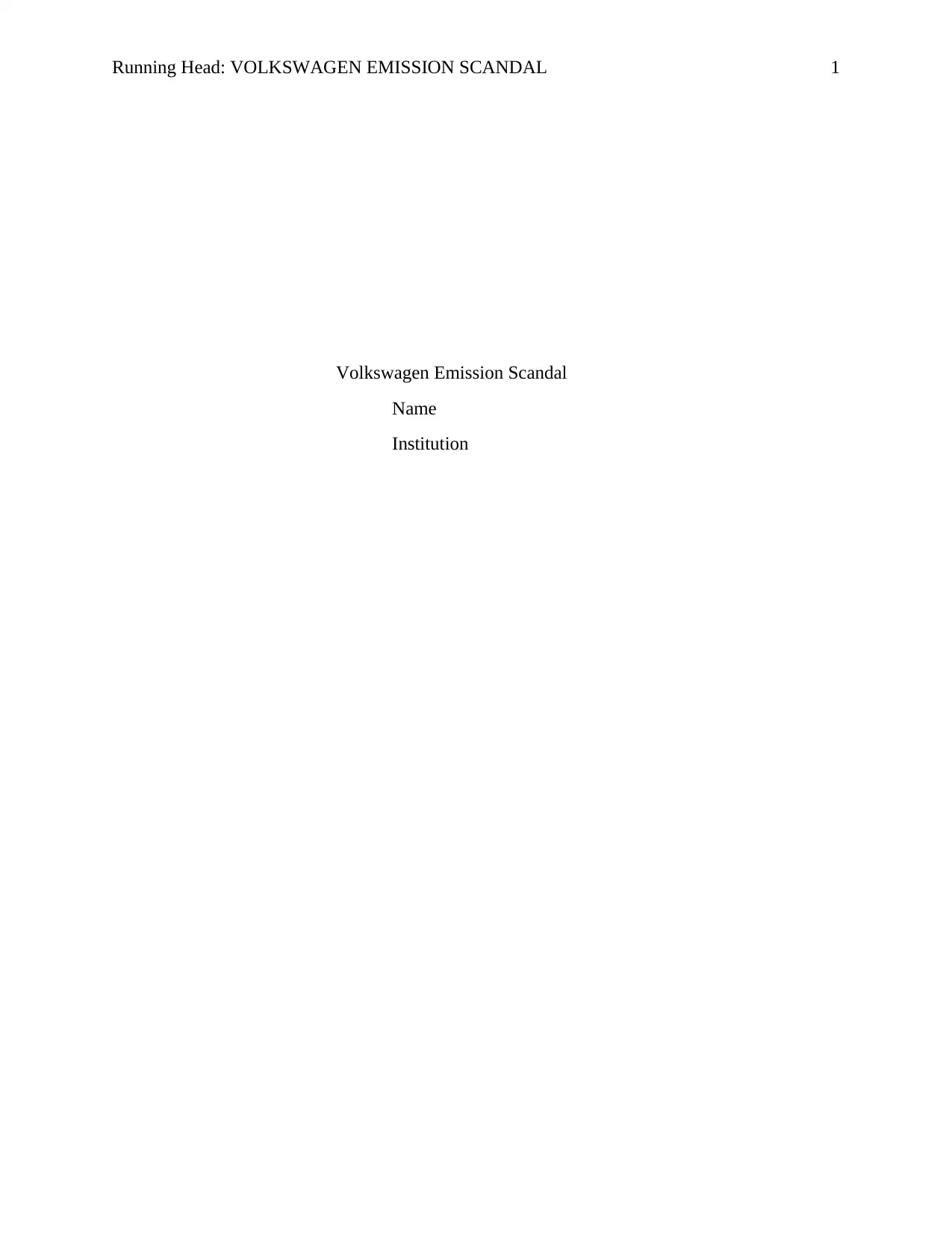
Running Head: VOLKSWAGEN EMISSION SCANDAL 1
Volkswagen Emission Scandal
Name
Institution
Volkswagen Emission Scandal
Name
Institution
Paraphrase This Document
Need a fresh take? Get an instant paraphrase of this document with our AI Paraphraser
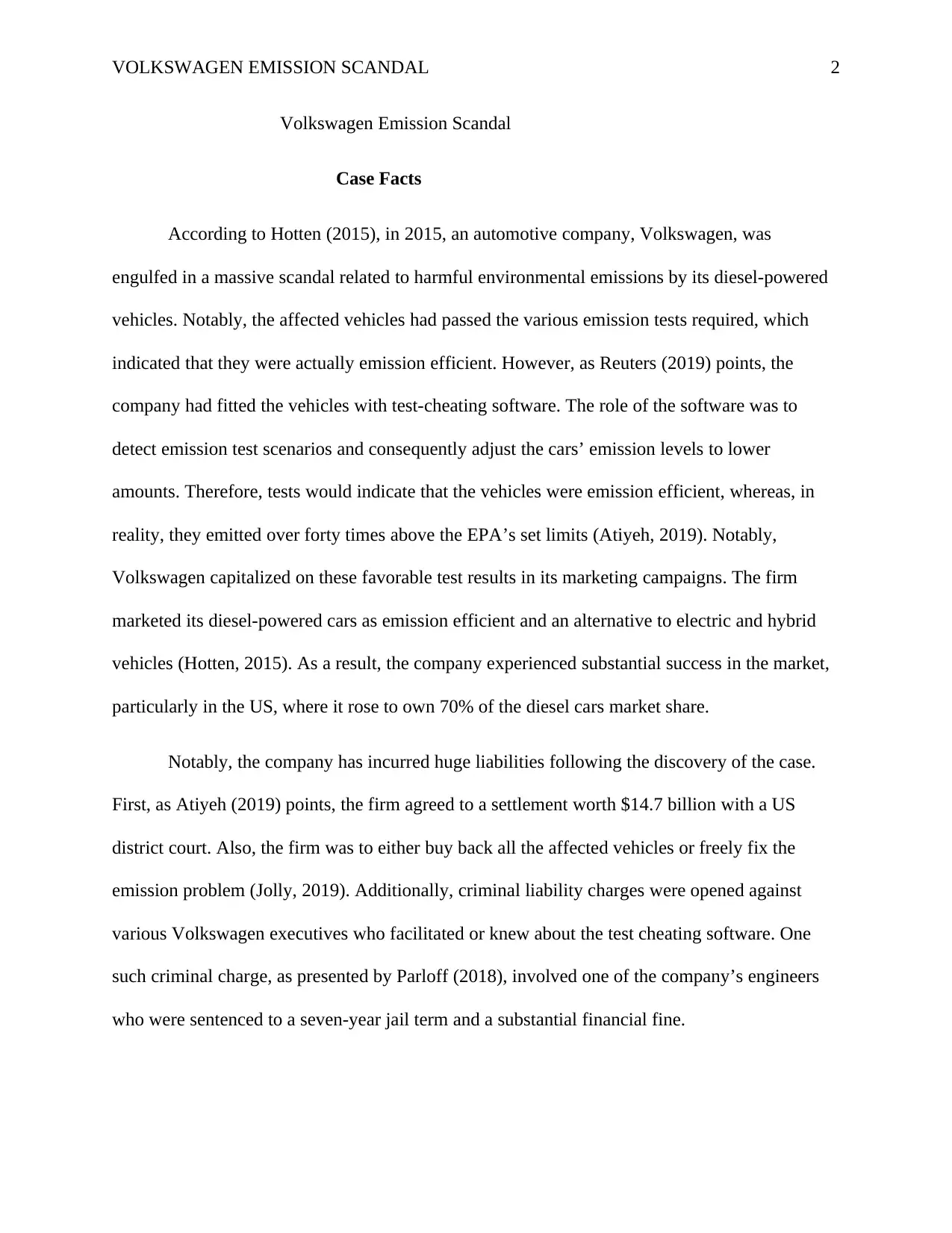
VOLKSWAGEN EMISSION SCANDAL 2
Volkswagen Emission Scandal
Case Facts
According to Hotten (2015), in 2015, an automotive company, Volkswagen, was
engulfed in a massive scandal related to harmful environmental emissions by its diesel-powered
vehicles. Notably, the affected vehicles had passed the various emission tests required, which
indicated that they were actually emission efficient. However, as Reuters (2019) points, the
company had fitted the vehicles with test-cheating software. The role of the software was to
detect emission test scenarios and consequently adjust the cars’ emission levels to lower
amounts. Therefore, tests would indicate that the vehicles were emission efficient, whereas, in
reality, they emitted over forty times above the EPA’s set limits (Atiyeh, 2019). Notably,
Volkswagen capitalized on these favorable test results in its marketing campaigns. The firm
marketed its diesel-powered cars as emission efficient and an alternative to electric and hybrid
vehicles (Hotten, 2015). As a result, the company experienced substantial success in the market,
particularly in the US, where it rose to own 70% of the diesel cars market share.
Notably, the company has incurred huge liabilities following the discovery of the case.
First, as Atiyeh (2019) points, the firm agreed to a settlement worth $14.7 billion with a US
district court. Also, the firm was to either buy back all the affected vehicles or freely fix the
emission problem (Jolly, 2019). Additionally, criminal liability charges were opened against
various Volkswagen executives who facilitated or knew about the test cheating software. One
such criminal charge, as presented by Parloff (2018), involved one of the company’s engineers
who were sentenced to a seven-year jail term and a substantial financial fine.
Volkswagen Emission Scandal
Case Facts
According to Hotten (2015), in 2015, an automotive company, Volkswagen, was
engulfed in a massive scandal related to harmful environmental emissions by its diesel-powered
vehicles. Notably, the affected vehicles had passed the various emission tests required, which
indicated that they were actually emission efficient. However, as Reuters (2019) points, the
company had fitted the vehicles with test-cheating software. The role of the software was to
detect emission test scenarios and consequently adjust the cars’ emission levels to lower
amounts. Therefore, tests would indicate that the vehicles were emission efficient, whereas, in
reality, they emitted over forty times above the EPA’s set limits (Atiyeh, 2019). Notably,
Volkswagen capitalized on these favorable test results in its marketing campaigns. The firm
marketed its diesel-powered cars as emission efficient and an alternative to electric and hybrid
vehicles (Hotten, 2015). As a result, the company experienced substantial success in the market,
particularly in the US, where it rose to own 70% of the diesel cars market share.
Notably, the company has incurred huge liabilities following the discovery of the case.
First, as Atiyeh (2019) points, the firm agreed to a settlement worth $14.7 billion with a US
district court. Also, the firm was to either buy back all the affected vehicles or freely fix the
emission problem (Jolly, 2019). Additionally, criminal liability charges were opened against
various Volkswagen executives who facilitated or knew about the test cheating software. One
such criminal charge, as presented by Parloff (2018), involved one of the company’s engineers
who were sentenced to a seven-year jail term and a substantial financial fine.
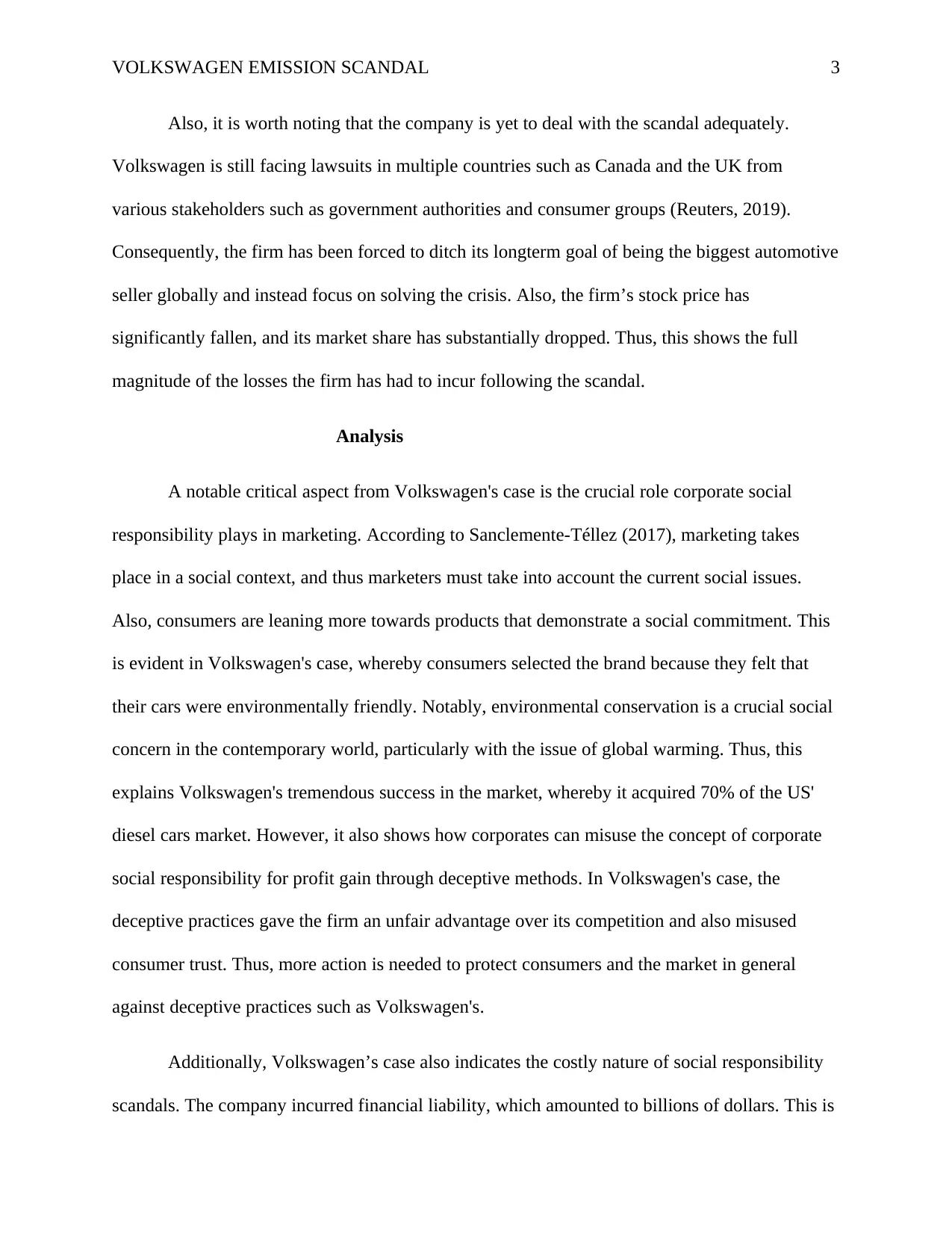
VOLKSWAGEN EMISSION SCANDAL 3
Also, it is worth noting that the company is yet to deal with the scandal adequately.
Volkswagen is still facing lawsuits in multiple countries such as Canada and the UK from
various stakeholders such as government authorities and consumer groups (Reuters, 2019).
Consequently, the firm has been forced to ditch its longterm goal of being the biggest automotive
seller globally and instead focus on solving the crisis. Also, the firm’s stock price has
significantly fallen, and its market share has substantially dropped. Thus, this shows the full
magnitude of the losses the firm has had to incur following the scandal.
Analysis
A notable critical aspect from Volkswagen's case is the crucial role corporate social
responsibility plays in marketing. According to Sanclemente-Téllez (2017), marketing takes
place in a social context, and thus marketers must take into account the current social issues.
Also, consumers are leaning more towards products that demonstrate a social commitment. This
is evident in Volkswagen's case, whereby consumers selected the brand because they felt that
their cars were environmentally friendly. Notably, environmental conservation is a crucial social
concern in the contemporary world, particularly with the issue of global warming. Thus, this
explains Volkswagen's tremendous success in the market, whereby it acquired 70% of the US'
diesel cars market. However, it also shows how corporates can misuse the concept of corporate
social responsibility for profit gain through deceptive methods. In Volkswagen's case, the
deceptive practices gave the firm an unfair advantage over its competition and also misused
consumer trust. Thus, more action is needed to protect consumers and the market in general
against deceptive practices such as Volkswagen's.
Additionally, Volkswagen’s case also indicates the costly nature of social responsibility
scandals. The company incurred financial liability, which amounted to billions of dollars. This is
Also, it is worth noting that the company is yet to deal with the scandal adequately.
Volkswagen is still facing lawsuits in multiple countries such as Canada and the UK from
various stakeholders such as government authorities and consumer groups (Reuters, 2019).
Consequently, the firm has been forced to ditch its longterm goal of being the biggest automotive
seller globally and instead focus on solving the crisis. Also, the firm’s stock price has
significantly fallen, and its market share has substantially dropped. Thus, this shows the full
magnitude of the losses the firm has had to incur following the scandal.
Analysis
A notable critical aspect from Volkswagen's case is the crucial role corporate social
responsibility plays in marketing. According to Sanclemente-Téllez (2017), marketing takes
place in a social context, and thus marketers must take into account the current social issues.
Also, consumers are leaning more towards products that demonstrate a social commitment. This
is evident in Volkswagen's case, whereby consumers selected the brand because they felt that
their cars were environmentally friendly. Notably, environmental conservation is a crucial social
concern in the contemporary world, particularly with the issue of global warming. Thus, this
explains Volkswagen's tremendous success in the market, whereby it acquired 70% of the US'
diesel cars market. However, it also shows how corporates can misuse the concept of corporate
social responsibility for profit gain through deceptive methods. In Volkswagen's case, the
deceptive practices gave the firm an unfair advantage over its competition and also misused
consumer trust. Thus, more action is needed to protect consumers and the market in general
against deceptive practices such as Volkswagen's.
Additionally, Volkswagen’s case also indicates the costly nature of social responsibility
scandals. The company incurred financial liability, which amounted to billions of dollars. This is
⊘ This is a preview!⊘
Do you want full access?
Subscribe today to unlock all pages.

Trusted by 1+ million students worldwide
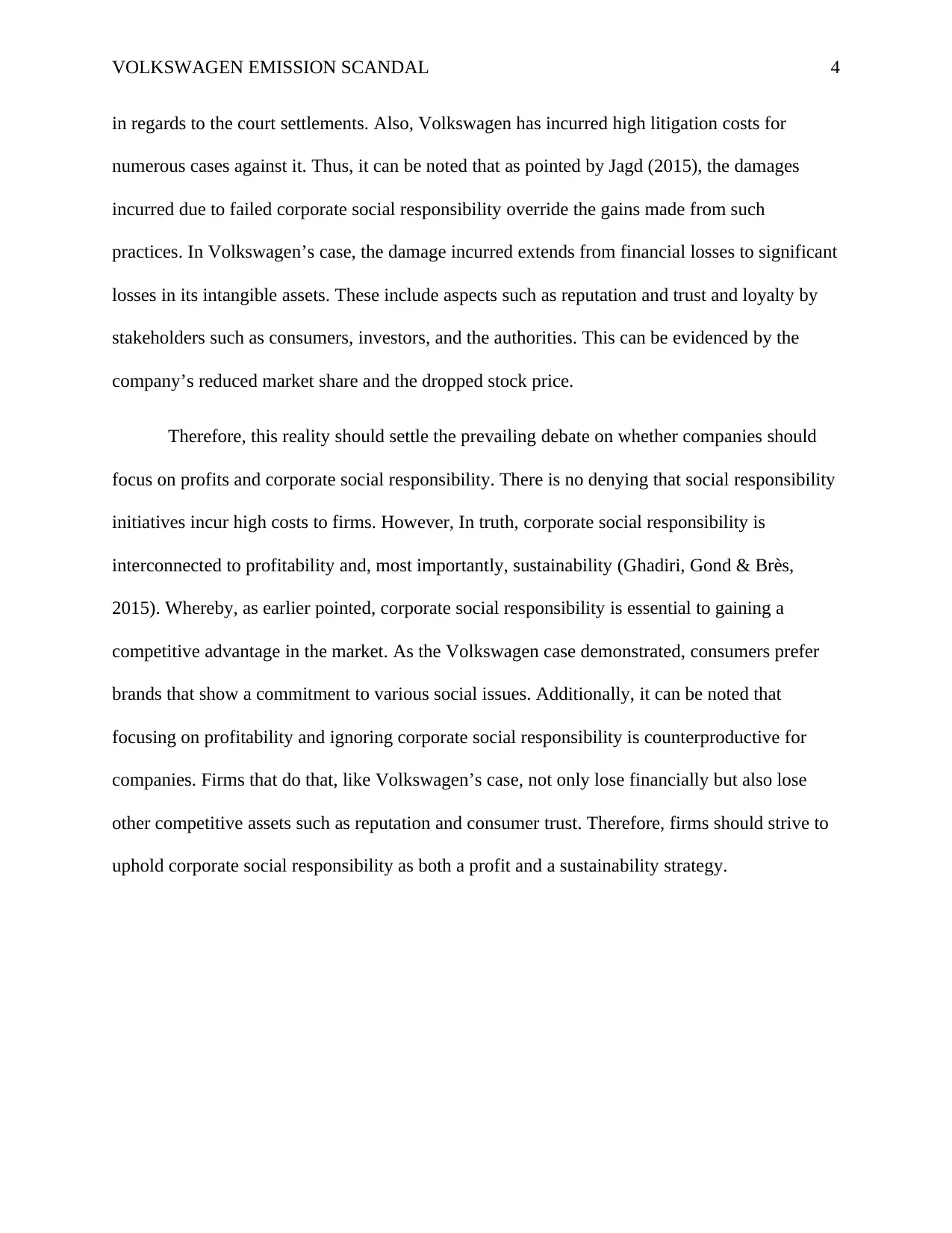
VOLKSWAGEN EMISSION SCANDAL 4
in regards to the court settlements. Also, Volkswagen has incurred high litigation costs for
numerous cases against it. Thus, it can be noted that as pointed by Jagd (2015), the damages
incurred due to failed corporate social responsibility override the gains made from such
practices. In Volkswagen’s case, the damage incurred extends from financial losses to significant
losses in its intangible assets. These include aspects such as reputation and trust and loyalty by
stakeholders such as consumers, investors, and the authorities. This can be evidenced by the
company’s reduced market share and the dropped stock price.
Therefore, this reality should settle the prevailing debate on whether companies should
focus on profits and corporate social responsibility. There is no denying that social responsibility
initiatives incur high costs to firms. However, In truth, corporate social responsibility is
interconnected to profitability and, most importantly, sustainability (Ghadiri, Gond & Brès,
2015). Whereby, as earlier pointed, corporate social responsibility is essential to gaining a
competitive advantage in the market. As the Volkswagen case demonstrated, consumers prefer
brands that show a commitment to various social issues. Additionally, it can be noted that
focusing on profitability and ignoring corporate social responsibility is counterproductive for
companies. Firms that do that, like Volkswagen’s case, not only lose financially but also lose
other competitive assets such as reputation and consumer trust. Therefore, firms should strive to
uphold corporate social responsibility as both a profit and a sustainability strategy.
in regards to the court settlements. Also, Volkswagen has incurred high litigation costs for
numerous cases against it. Thus, it can be noted that as pointed by Jagd (2015), the damages
incurred due to failed corporate social responsibility override the gains made from such
practices. In Volkswagen’s case, the damage incurred extends from financial losses to significant
losses in its intangible assets. These include aspects such as reputation and trust and loyalty by
stakeholders such as consumers, investors, and the authorities. This can be evidenced by the
company’s reduced market share and the dropped stock price.
Therefore, this reality should settle the prevailing debate on whether companies should
focus on profits and corporate social responsibility. There is no denying that social responsibility
initiatives incur high costs to firms. However, In truth, corporate social responsibility is
interconnected to profitability and, most importantly, sustainability (Ghadiri, Gond & Brès,
2015). Whereby, as earlier pointed, corporate social responsibility is essential to gaining a
competitive advantage in the market. As the Volkswagen case demonstrated, consumers prefer
brands that show a commitment to various social issues. Additionally, it can be noted that
focusing on profitability and ignoring corporate social responsibility is counterproductive for
companies. Firms that do that, like Volkswagen’s case, not only lose financially but also lose
other competitive assets such as reputation and consumer trust. Therefore, firms should strive to
uphold corporate social responsibility as both a profit and a sustainability strategy.
Paraphrase This Document
Need a fresh take? Get an instant paraphrase of this document with our AI Paraphraser
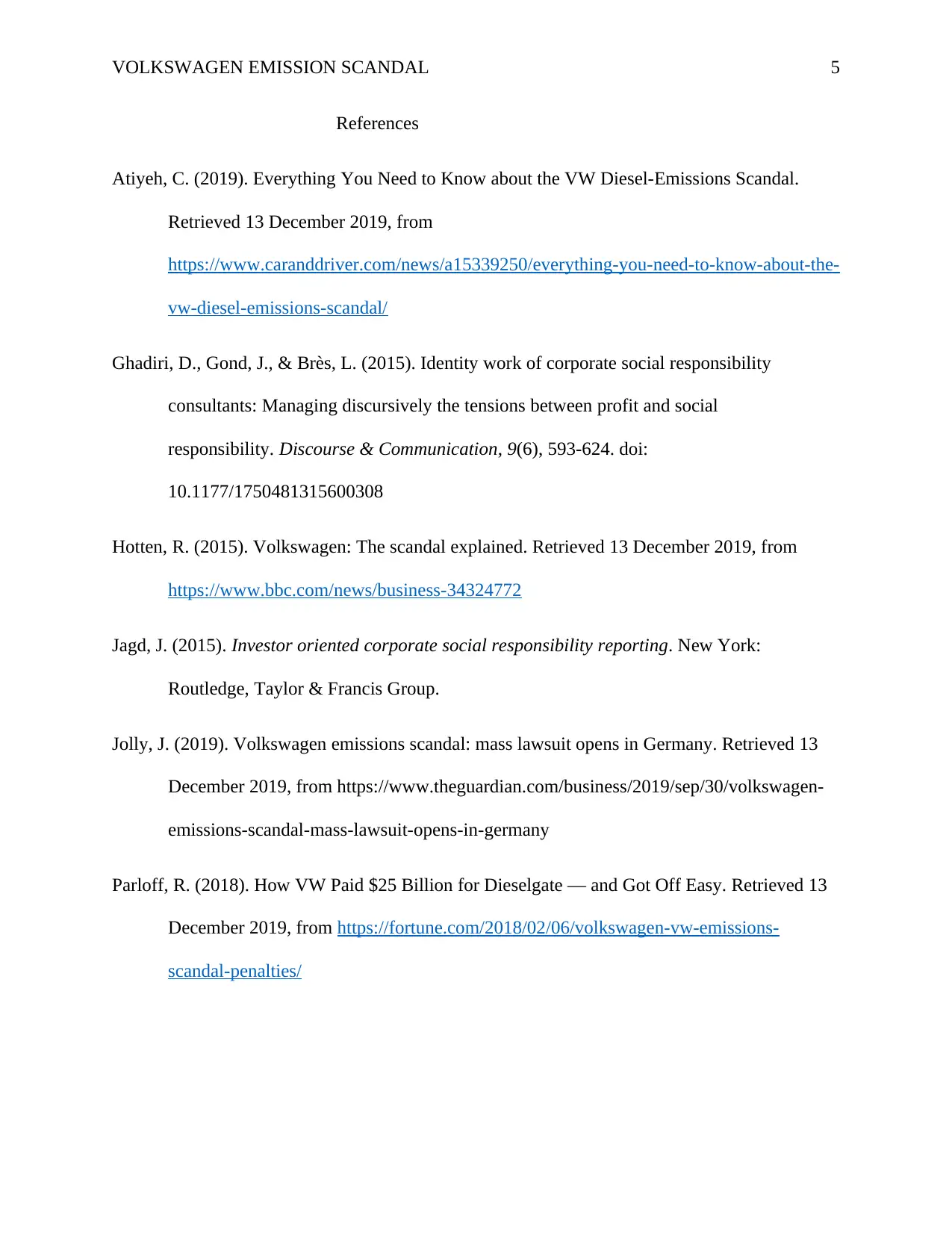
VOLKSWAGEN EMISSION SCANDAL 5
References
Atiyeh, C. (2019). Everything You Need to Know about the VW Diesel-Emissions Scandal.
Retrieved 13 December 2019, from
https://www.caranddriver.com/news/a15339250/everything-you-need-to-know-about-the-
vw-diesel-emissions-scandal/
Ghadiri, D., Gond, J., & Brès, L. (2015). Identity work of corporate social responsibility
consultants: Managing discursively the tensions between profit and social
responsibility. Discourse & Communication, 9(6), 593-624. doi:
10.1177/1750481315600308
Hotten, R. (2015). Volkswagen: The scandal explained. Retrieved 13 December 2019, from
https://www.bbc.com/news/business-34324772
Jagd, J. (2015). Investor oriented corporate social responsibility reporting. New York:
Routledge, Taylor & Francis Group.
Jolly, J. (2019). Volkswagen emissions scandal: mass lawsuit opens in Germany. Retrieved 13
December 2019, from https://www.theguardian.com/business/2019/sep/30/volkswagen-
emissions-scandal-mass-lawsuit-opens-in-germany
Parloff, R. (2018). How VW Paid $25 Billion for Dieselgate — and Got Off Easy. Retrieved 13
December 2019, from https://fortune.com/2018/02/06/volkswagen-vw-emissions-
scandal-penalties/
References
Atiyeh, C. (2019). Everything You Need to Know about the VW Diesel-Emissions Scandal.
Retrieved 13 December 2019, from
https://www.caranddriver.com/news/a15339250/everything-you-need-to-know-about-the-
vw-diesel-emissions-scandal/
Ghadiri, D., Gond, J., & Brès, L. (2015). Identity work of corporate social responsibility
consultants: Managing discursively the tensions between profit and social
responsibility. Discourse & Communication, 9(6), 593-624. doi:
10.1177/1750481315600308
Hotten, R. (2015). Volkswagen: The scandal explained. Retrieved 13 December 2019, from
https://www.bbc.com/news/business-34324772
Jagd, J. (2015). Investor oriented corporate social responsibility reporting. New York:
Routledge, Taylor & Francis Group.
Jolly, J. (2019). Volkswagen emissions scandal: mass lawsuit opens in Germany. Retrieved 13
December 2019, from https://www.theguardian.com/business/2019/sep/30/volkswagen-
emissions-scandal-mass-lawsuit-opens-in-germany
Parloff, R. (2018). How VW Paid $25 Billion for Dieselgate — and Got Off Easy. Retrieved 13
December 2019, from https://fortune.com/2018/02/06/volkswagen-vw-emissions-
scandal-penalties/
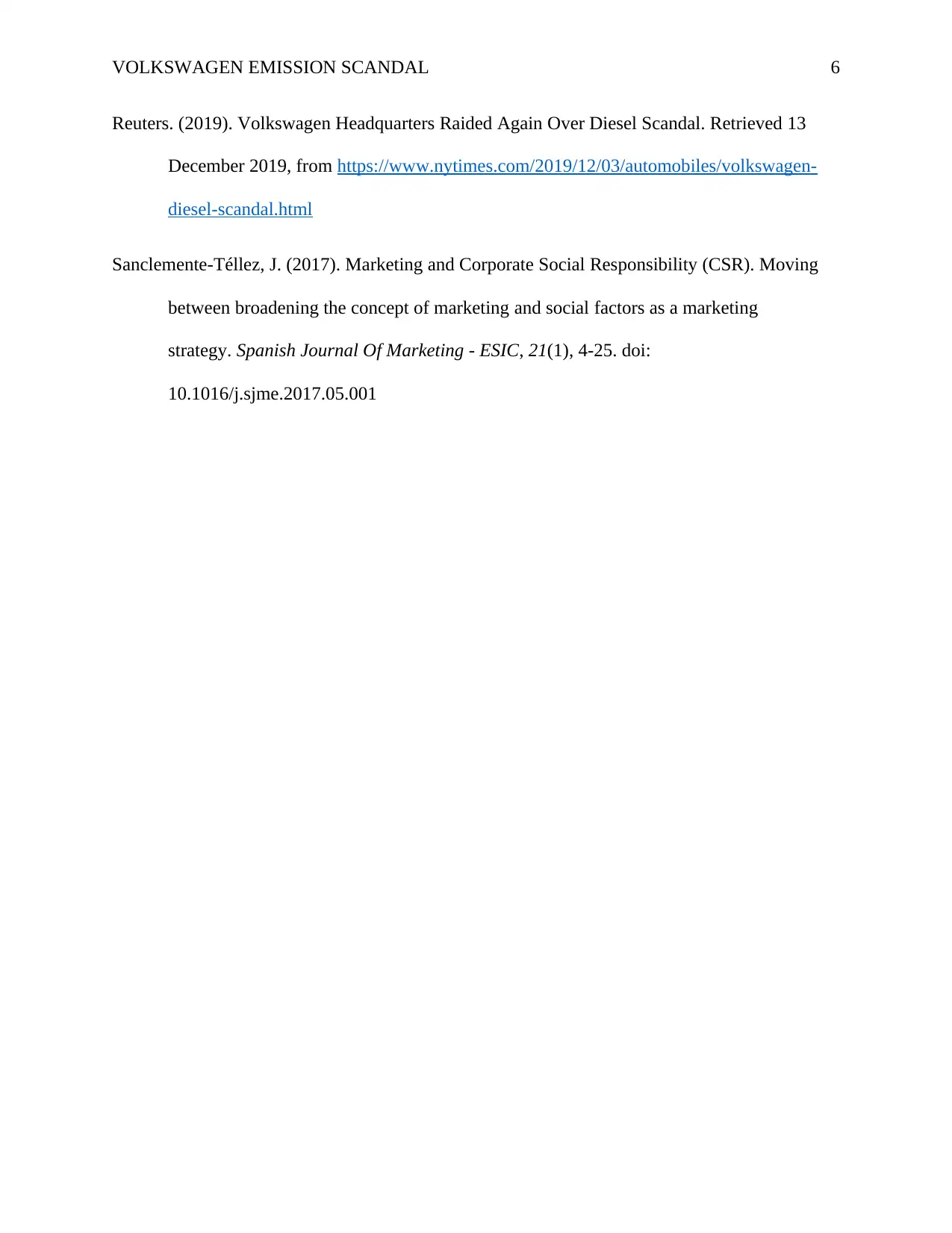
VOLKSWAGEN EMISSION SCANDAL 6
Reuters. (2019). Volkswagen Headquarters Raided Again Over Diesel Scandal. Retrieved 13
December 2019, from https://www.nytimes.com/2019/12/03/automobiles/volkswagen-
diesel-scandal.html
Sanclemente-Téllez, J. (2017). Marketing and Corporate Social Responsibility (CSR). Moving
between broadening the concept of marketing and social factors as a marketing
strategy. Spanish Journal Of Marketing - ESIC, 21(1), 4-25. doi:
10.1016/j.sjme.2017.05.001
Reuters. (2019). Volkswagen Headquarters Raided Again Over Diesel Scandal. Retrieved 13
December 2019, from https://www.nytimes.com/2019/12/03/automobiles/volkswagen-
diesel-scandal.html
Sanclemente-Téllez, J. (2017). Marketing and Corporate Social Responsibility (CSR). Moving
between broadening the concept of marketing and social factors as a marketing
strategy. Spanish Journal Of Marketing - ESIC, 21(1), 4-25. doi:
10.1016/j.sjme.2017.05.001
⊘ This is a preview!⊘
Do you want full access?
Subscribe today to unlock all pages.

Trusted by 1+ million students worldwide
1 out of 6
Related Documents
Your All-in-One AI-Powered Toolkit for Academic Success.
+13062052269
info@desklib.com
Available 24*7 on WhatsApp / Email
![[object Object]](/_next/static/media/star-bottom.7253800d.svg)
Unlock your academic potential
Copyright © 2020–2025 A2Z Services. All Rights Reserved. Developed and managed by ZUCOL.



